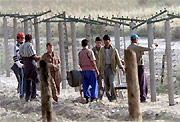|
Uzbekistan's President Islam Karimov
Strange Bedfellow for U.S. Coalition Against Taliban
 NPR News radio coverage of Uzbekistan and its president, Islam Karimov. NPR News radio coverage of Uzbekistan and its president, Islam Karimov.

|
|
Gen. Tommy Franks (L), commander in chief of the U.S. Central Command, and Uzbek President Islam Karimov, Oct. 30, 2001.
Photo: Reuters © 2001
|
Nov. 1, 2001 -- Islam Karimov is an authoritarian ruler of Uzbekistan, a poor Central Asian nation that most Americans would have a hard time placing on a map. But this former Soviet republic, located just north of Afghanistan, has become an important partner in America's military campaign against the Taliban.
Uzbekistan provides the American military with a foothold in Afghanistan's backyard, hosting around 1,000 U.S. troops from the 10th Mountain Division. It has also granted U.S. planes access to its airspace and an airbase for search and rescue, as well as humanitarian, purposes. Although the Pentagon and Karimov's government aren't giving specific information on the movements of the U.S. forces deployed there, no other country neighboring Afghanistan -- with the possible exception of Pakistan -- has provided as much to aid U.S. operations in the region.
In return for its assistance, Karimov's government will get much-needed financial help from Washington. Uzbekistan is struggling with the legacy of the Soviet era. Cotton is the chief cash crop, the result of former Soviet leader Nikita Kruschev's effort to turn the country into the main source of cotton for the heavily controlled Soviet economy.

|
|
Workers reinforce Uzbekistan's border with Afghanistan with barbed wire near Termez, Uzbekistan, Oct. 15, 2001.
Photo: Reuters © 2001
|
Cooperating with the Bush administration also helps President Karimov's political agenda. His promise to distance Uzbekistan from Russia and let his country choose its own allies has been welcomed by his people. And assisting America in its fight against the Taliban is a way for Karimov to demonstrate his policy.
So far, cooperation with America has been viewed favorably by most Uzbeks. In contrast to Pakistan, there are no major riots opposing the U.S. attacks on the Taliban. Although most Uzbeks are officially Muslims, few actually practice the religion. Many mosques remain empty even on Fridays, the Muslim holy day -- a result of 75 years under communism and a systematic crackdown on all unofficial forms of Islam that followed when the republic gained its independence.
But for the Bush administration, working with Karimov is also a tricky proposition. A former Soviet apparatchik, he has done little to change his old ways after becoming the president of Uzbekistan in 1990. He continues to restrict all political oppositions and free media, prompting various international organizations to label him a "human rights nightmare." He has been also slow to embrace market reforms that could revive the country's ailing economy. Many experts on the region say the country has changed little since its years under the Soviet rule.
Working with the Pentagon is not a risk-free endeavor for Karimov either. Uzbekistan's involvement in the war against the Taliban could turn out to be a big test for the country's quasi-dictatorial government. A radical Islamic insurgency is always a possibility, and closer ties with the West might undermine Karimov's resolve to keep Uzbekistan under tight authoritarian control.
Other Resources
• Library of Congress country study on Uzbekistan
• Human Rights Watch Report on Uzbekistan
• Map of Uzbekistan on the AskAsia.org Web site
• Report on human rights and Middle East from The Brookings Institution
|